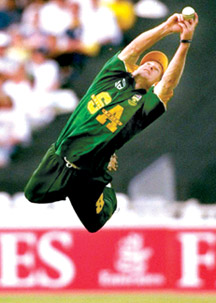Fielding standards lofty - Rhodes
Amol karhadkar
If you think Sachin Tendulkar is the only survivor from the 1992
World Cup till this edition, think again. Tendulkar's fielding coach
with his IPL franchise, Mumbai Indians, Jonty Rhodes is also going to be
a part of his sixth successive Cup campaign. Having represented South
Africa in 1992, 1996, 1999 and 2003, and then being the Proteas'
fielding coach in 2007, Rhodes is Kenya's fielding consultant for this
edition, although he is going to be with the team only till their first
game.
In an exclusive interview with HT, Rhodes feels it's difficult for
anyone to be a fielding all-rounder, a term that was coined for the
diving wizard, in future.
Excerpts:
|

Johnty Rodes during his era. Rhodes is, without any doubt,
the greatest fielder of all time. |
How did Jonty Rhodes manage to change the approach towards fielding?
It depends on individuals. When I came to the scene before the 1992
World Cup, no one was really diving around and putting himself in
danger. Fielding wasn't a big aspect of world cricket. I had played
hockey, soccer, tennis, so diving around was something that I had done
since I was small.
Do you think the legacy of fielding all-rounders has continued since
your retirement?
If you look at the international level, fielding standards have
improved and South African cricket has played an instrumental role.
For a player to stand out is difficult because everyone's fielding
well. In 1992, it was easier for me because nobody else was doing it.
What does being part of another World Cup mean to you?
I have played in four. I have been to the other two, so it's just
like home. Although we have two of the guys playing their fifth World
Cup, I see most of the younger Kenyan players getting their cameras out
and taking pictures everywhere they go. It's a very special time, having
been to a couple.
Your leap to run out Inzamam-ul Haq is one the best World Cup
memories. What is your most memorable moment?
It was against Australia in Australia. They were the holders and we
were playing our first Cup game after coming back from a 27-year
isolation. I didn't even get to bat, we won by nine wickets. But just to
play cricket for South Africa, it was better than a dream coming true.
As a kid, with the sporting sanctions, I never thought it would happen.
It is said fielding is the easiest skill to learn in cricket.
The biggest drawback the associate teams face is that they don't play
enough international cricket. Four-five games a year are not enough.
The easiest way they can improve is through fielding and fitness. To
do this, they don't need to be playing against international teams day
in and day out and that's what the Kenyans have done.
Is it easier to teach a bunch of players at this level, and
especially in this age?
The Kenyans are athletes by nature. So to work with an athlete is a
lot easier. If you look at the Olympics, they are winning gold all the
time.
How did the Kenya role come about?
I was approached in November when the Kenyan team came to Pretoria
for a high performance training camp. Eldine Baptiste, who is the head
coach, played against me in South Africa and ended up coaching my
provincial side. He invited me to come to Pretoria to work on the
fielding initially and then also on their batting since he was a bowling
all-rounder.
Does not being with the team work against you?
My work with them was regarding preparation for the World Cup.
Sometimes when you are going to be with a team for two weeks or so,
you tend to think how am I going to make a difference?. But when I
joined the team a month ago, they were doing the fielding drills as good
as an IPL team. You can make a difference if the team is willing to take
your advice.
How different is it to coach an associate team to an international or
first-class side?
Coming from Test-playing countries or even IPL to be associated with
a team like Kenya is different. A week ago in Dubai, the four associate
teams who had qualified Kenya, Canada, Ireland and Netherlands had a
training camp. The work ethic of the sides, not just Kenya, was amazing.
I got to play cricket for South Africa in 1992. And even though we all
were professionals, we hardly got a salary. All the guys I was playing
with either had jobs or were playing for the university.
So it's pretty much the same with the associate teams. The Dutch
team, only two of them have contracts, the rest of them are working.
They have to take leave to play cricket. The Kenyan guys have just got
contracted. They play the game because they love it.
Any regrets of choosing cricket over hockey?
All my hockey friends retired long before I did. They had to because
they were working. Even though they were representing South Africa at
the Olympics, they had to work. I am grateful that cricket chose me more
than I chose cricket.
Cricketnirvana
|



